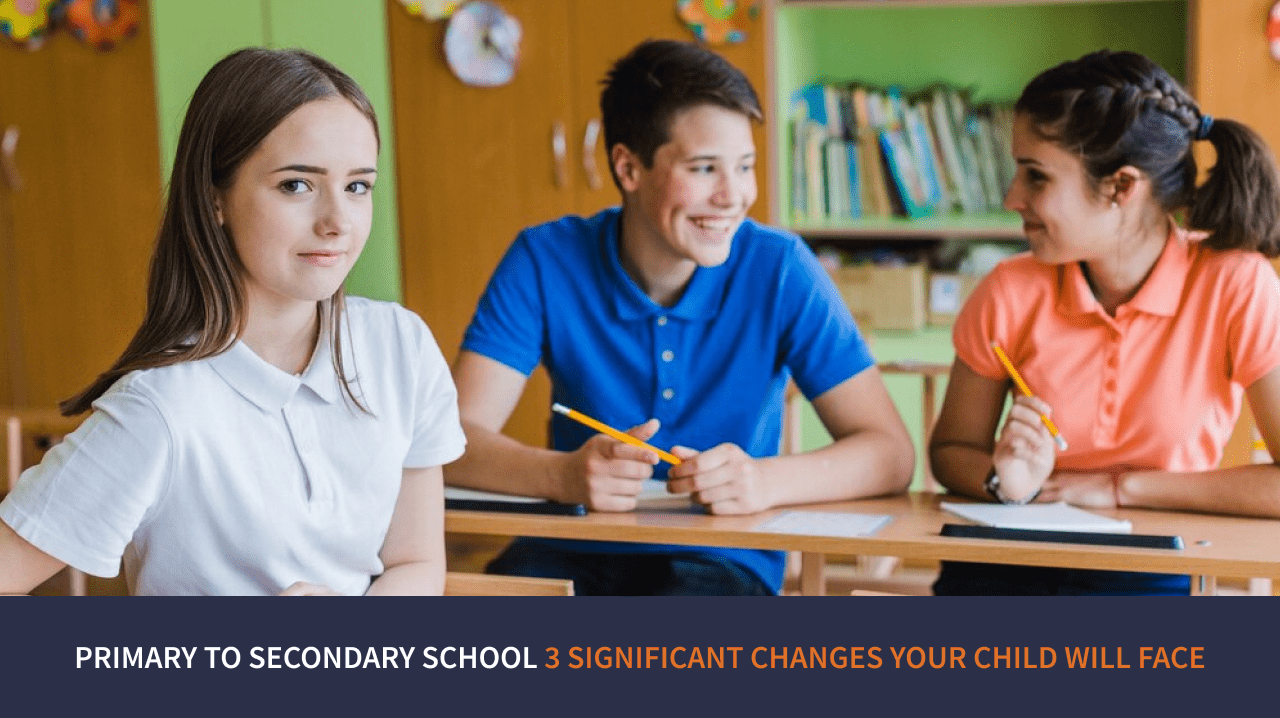Transition from Primary school to Secondary School

Introduction:
The transition from Primary to secondary school denotes a pivotal stage in a kid’s educational excursion, delivering significant changes that shape their academic and self-awareness. This article digs into three vital transformations your Child will experience during this transition, offering bits of knowledge into the challenges and opportunities that lie ahead. From navigating a bigger academic landscape to adjusting socially and emotionally, understanding these progressions is principal for parents and instructors the same to offer the Primary help for a smooth transition.
I.Academic Intricacy and Specialization :
The transition from Primary to secondary school signifies a critical shift in academic dynamics, presenting elevated intricacy and specialization. Not at all like the wide establishment laid in Primary education, secondary school dives into subjects with an engaged and top to bottom methodology. Specific educators bring nuanced experiences, and the consideration of elective subjects engages students to investigate their inclinations, laying the preparation for potential profession ways. Be that as it may, this transition presents a test in adjusting to a more thorough educational program.
Students should explore different subjects, each requesting a more profound comprehension. Creating powerful study propensities becomes vital to succeed in this particular academic climate, where the accentuation shifts from general information to subject-specific ability. Navigating this academic transformation is fundamental for students to flourish in the secondary school setting, where a custom-made and concentrated way to deal with learning turns into the foundation of their educational excursion.
II.Expanded Independence and Moral Responsibility :
The transition from Primary to secondary school signifies an eminent rise in the assumptions for independence and moral responsibility put upon students. As opposed to the organized climate of elementary school, where educators intently guide and screen, secondary education underlines a more independent way to deal with learning. Students are entrusted with freely dealing with their timetables, tasks, and cutoff times, cultivating a feeling of autonomy. The introduction of additional lengthy and complex tasks further emphasizes the need for successful using time effectively and authoritative skills. This shift towards more noteworthy confidence fills in as a significant groundwork for the uplifted liabilities anticipating students in advanced education and the expert domain.
Parents and teachers assume a necessary part in sustaining these skills by bit by bit entrusting students with expanded autonomy, combined with strong direction. Empowering students to assume responsibility for their academic obligations constructs an establishment for lifelong skills, ingraining a feeling of responsibility and resilience. As students explore this excursion towards more prominent independence, the cooperative exertion of parents and teachers becomes Primary in guaranteeing a smooth transition and planning students for the multifaceted requests of their developing academic and expert landscapes.
III. Social Dynamics and Peer Relationships :
The transition from Primary to secondary school introduces an extraordinary shift in the social dynamics and peer relationships that shape a student’s educational excursion.
Bigger Student Body and Different Social Climate :
Secondary education acquaints students with a greater and different social landscape. With a bigger student body, connections become more fluctuated, presenting students to peers from different grade schools. This variety adds to the intricacy of social dynamics, encouraging a rich embroidery of encounters.
Navigating New Social Hierarchies :
As students transition to secondary school, they explore through new social hierarchies that arise in the bigger and more different student populace. The dynamics of fellowships and social circles develop, introducing challenges and opportunities for students to lay out their jobs inside the more extensive social setting.
Peer Relationships and Identity Formation :
Shaping significant peer relationships becomes the dominant focal point during this transition. Students not just interface with peers inside their nearby circles yet additionally have the opportunity to frame associations that stretch out past. Peer pressure turns out to be more articulated as students want to lay out their identity inside the more extensive social texture, impacting their decisions and collaborations.
Building Social and Emotional Skills :
The advancing social dynamics require the improvement of powerful social and emotional skills. Students figure out how to explore complex relationships, resolve clashes, and adjust to the different characters inside the bigger secondary school local area. Building these skills becomes central for encouraging solid and significant associations.
In navigating these changes, students benefit from the direction and backing of parents and teachers. Making an open discourse about the challenges and opportunities of the changing social landscape permits students to foster resilience and a feeling of having a place. By effectively cultivating social and emotional skills, both inside and outside the quick peer bunch, students are better prepared to flourish in the unpredictable social embroidered artwork of secondary education, making way for their progress with self-improvement and success.
Conclusion :
In navigating the transition from Primary to secondary school, parents, teachers, and students should altogether perceive and address the significant changes that lie ahead. Embracing the expanded academic intricacy, encouraging independence and moral responsibility, and navigating the developing social dynamics are critical parts of guaranteeing a successful transition. By getting it and effectively supporting these changes, we enable students to adapt to the challenges as well as flourish in the powerful landscape of secondary education, making way for their progress with development and success.x

